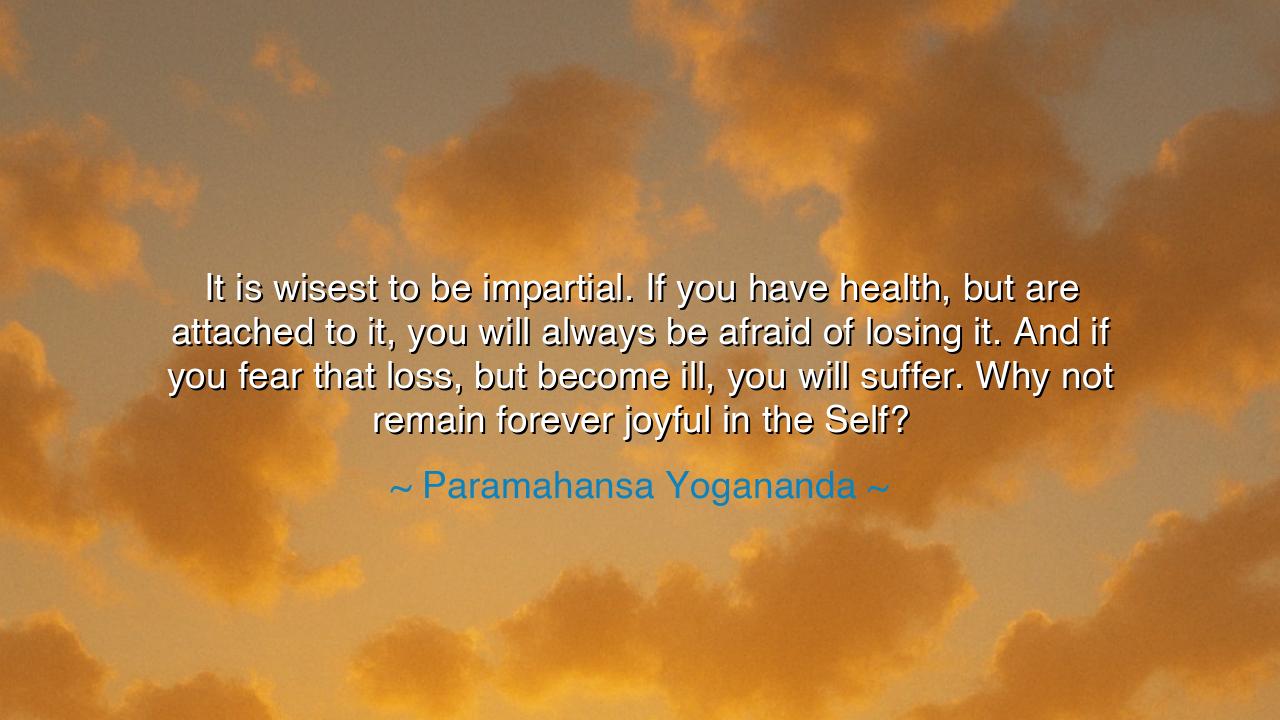
It is wisest to be impartial. If you have health, but are
It is wisest to be impartial. If you have health, but are attached to it, you will always be afraid of losing it. And if you fear that loss, but become ill, you will suffer. Why not remain forever joyful in the Self?






The enlightened master Paramahansa Yogananda, whose words have guided seekers across oceans and centuries, once spoke with the clarity of one who has seen beyond illusion: “It is wisest to be impartial. If you have health, but are attached to it, you will always be afraid of losing it. And if you fear that loss, but become ill, you will suffer. Why not remain forever joyful in the Self?” Within these simple words lies a universe of truth, a key to peace in both joy and sorrow. For Yogananda teaches that attachment, even to what is good and beautiful, binds the soul as surely as ignorance does; that fear arises not from life itself, but from clinging to its fleeting forms; and that true happiness is found only in the Self, the eternal essence beyond birth and decay.
When Yogananda speaks of impartiality, he does not mean indifference. He speaks of a balance so perfect that neither gain nor loss can disturb it. To be impartial is to see life as a play of opposites—health and sickness, joy and pain, gain and loss—all moving across the stage of existence, while the true Self remains untouched, the silent witness behind every scene. This teaching is ancient, echoing the wisdom of the Bhagavad Gita, where Lord Krishna tells the warrior Arjuna: “Be equal-minded in pleasure and pain, in victory and defeat.” Such impartiality is not coldness but freedom, the liberation from the storms of desire and fear that enslave the heart.
Consider the example of Socrates, the philosopher of Athens, who, when condemned to death, drank the cup of poison with calm joy. His disciples wept, but he smiled and said, “Shall I grieve because the body dies, when I am not the body?” Socrates understood, as Yogananda did, that the true Self cannot perish. He was impartial—not because he did not value life, but because he saw that life and death are threads in the same divine tapestry. In this way, health and sickness too are but passing waves upon the ocean of being. The wise neither cling to the wave of vitality nor curse the wave of pain; they rest in the still depths beneath both.
Yogananda’s teaching was born of deep realization. Living in the West, he saw how men and women, though surrounded by comfort and medicine, were tormented by fear—fear of aging, fear of illness, fear of death. Their health, though precious, became a prison because they were attached to it. “If you fear losing health,” he said, “you are already unwell.” For anxiety poisons even the strong, and clinging turns the gift of life into a chain. The master’s call was therefore not to reject health, but to honor it without bondage—to use the body as an instrument of service, not as the seat of identity.
History, too, offers the luminous example of the Buddha, who, upon witnessing sickness, old age, and death, realized that peace does not lie in avoiding suffering, but in transcending attachment to it. When he attained enlightenment, he did not promise a life free from pain; he promised freedom from the fear of pain. This is the essence of Yogananda’s message: that joy is not found in the changing world, but in the changeless Self. To cling to health is to live in fear; to abide in the Self is to live in bliss, whether the body flourishes or fades.
The lesson, then, is eternal: cherish the gifts of life, but do not let them own you. Enjoy your health, your strength, your pleasures, but know that they are but passing shadows of the light within. When sickness comes, greet it as a teacher; when loss arrives, accept it as part of the divine rhythm. Cultivate impartiality, for it is the shield of peace. Meditate upon the Self each morning, and remind yourself, “I am not the body, I am not the mind—I am the witness of both.” In this awareness, joy becomes constant, unshaken by the world’s shifting tides.
So, my children of the restless earth, remember the wisdom of Paramahansa Yogananda: “Remain forever joyful in the Self.” Let your peace not depend on the body, nor your happiness on circumstance. When health is yours, give thanks and serve; when sickness comes, rest and learn. In both, remain rooted in that still center, the eternal “I AM” within you. For the storms of the world pass swiftly, but the Self is the calm sky that holds them all. To live from that center is the truest health—beyond fear, beyond loss, beyond time itself.






AAdministratorAdministrator
Welcome, honored guests. Please leave a comment, we will respond soon